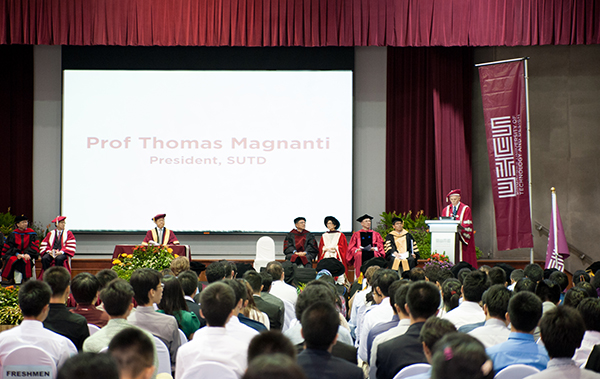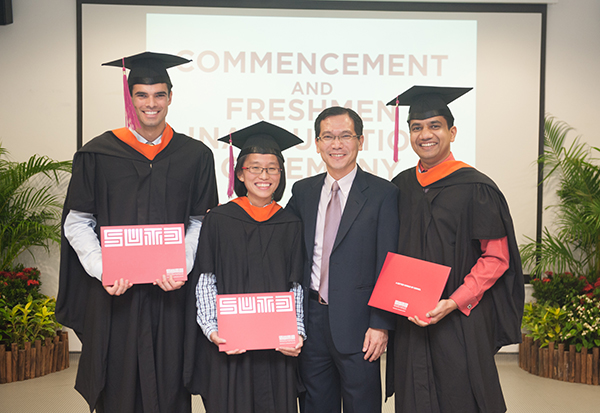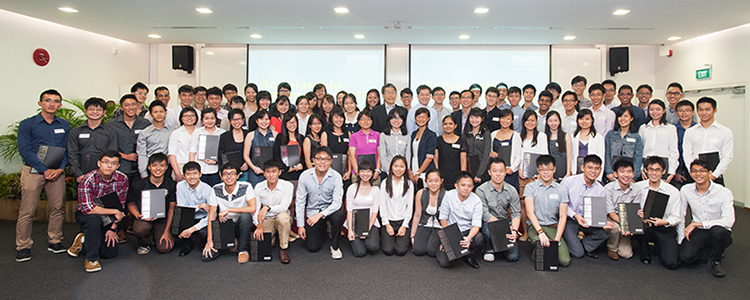Speech by SUTD President, Professor Thomas Magnanti at the SUTD Commencement & Freshmen Inauguration Ceremony
Mr. Choo Chiau Beng, Chief Executive Officer of Keppel Corporation
Mr. Philip Ng, Chairman of the SUTD Board of Trustees
Director of the MIT-SUTD Collaboration Office, Professor John Brisson
Director of International Design Institute at Zhejiang University, Dr. Liu Bo
SUTD Colleagues
Distinguished guests
And, especially, our SUTD students.
It is wonderful to be with you today to celebrate the first graduation of SUTD students, as well as to welcome SUTD’s second intake of undergraduate students. Congratulations to those who are graduating today, and for those of you who are joining us, you should look forward to one of the most special times in your life.

Commencement of Graduates
We celebrate three graduates today, Karthikeyan Rajasekharan, Teo Yi Linn and Nikhil Jain.
These three students are the very first SUTD graduates.They enrolled in the MIT-SUTD Dual Masters’ Programme, a joint collaboration with MIT.In this two year programme, with a year of coursework at MIT and a year of research at SUTD, students receive a truly dual and international experience with the opportunity to immediately apply their newly acquired knowledge to solve real world problems.
This experience is truly stimulating and enriching. As described by Karthik, “The first Masters at MIT allowed me to learn about systems architecture, data analytics, technology incubation, innovation management and product design.”
All that in one year! Remarkable.
He goes on to say, “For my second Masters at SUTD, I researched the application of data science to online communities.This combination of strong theory gained at MIT and directed research performed at SUTD has equipped me with the right skills to tackle the data analysis challenges of the future.”
I am impressed.
Karthik’s area of expertise is Information Systems Technology and Design and his research aids companies in better understanding their customer community interactions. We are proud to report that Karthik is currently working at Google, a company that needs no introduction.

The success of our graduates is evidence that SUTD is providing an innovative education that is truly relevant for today’s world.This is especially important as this is a time of considerable change and introspection within higher education, not just in Singapore, but across the world.
Let me speak on those issues for a few minutes.
Creation of New Universities
As we stand here today many new universities are being created throughout the world, each developed with unique objectives to cater to changing demands of students and industry.
As an example, the King Abdullah University of Science and Technology (KAUST) is the first mixed-gender university campus in Saudi Arabia. It offers graduate programmes with a focus on advance science and technology and it aims to nurture the King's vision of a new "House of Wisdom."
Another example is Education City in Qatar, which is an initiative of the Qatar Foundation for Education, Science and Community Development. Education City comprises elite universities (including branch campuses of 6 American universities, 1 British university and 1 French university), several academic and training programs, and the Qatar Science and Technology Park which boasts more than 21 world class companies involved in scientific research and development.
In Abu Dhabi and Russia new universities are being established, like SUTD, in collaboration with MIT. The Skolkovo Institute of Science and Technology (Skoltech) is a private graduate research university, with a mission to educate students, advance knowledge, and foster innovation to address critical scientific, technological, and innovation challenges and gaps facing Russia and the world.
The Masdar Institute of Science and Technology is the world’s first graduate-level university dedicated to providing real-world solutions to issues of sustainability. It aims to support Abu Dhabi’s transition to a knowledge-based economy and enhance the position of Abu Dhabi as a leader in global energy.
These new universities bring competition to higher education and offer significant and innovative opportunities, especially in the regions in which they are anchored.
Online Learning
The traditional form of university education, one where students physically attend lectures and classes is being challenged by the availability of many online courses.
A paper An Avalanche is Coming, published by the United Kingdom’s Institute of Public Policy Research, states that, “The new competition, the real threat, is not so much the emergence of these new universities specifically designed to imitate the great western universities; it is the emergence of entirely new models of university which are seeking to exploit the radically changed circumstances that are the result of globalisation and the digital revolution.”
Undeniably, Massive Open Online Courses (in short MOOCs) are a force capable of changing the landscape of higher education. A MOOC is an online course aimed at large-scale interactive participation and open access via the web. While online education and distance learning are not new, what’s new with MOOCs is the improved quality of the online experience through technology and design, and also the calibre of the instructors that some MOOCs offer.
The New York Times dubbed 2012 ‘The Year of the MOOC’ and Time magazine said that free MOOCs open the door to the ‘Ivy League for the Masses.’
Each MOOC is unique, but courses generally feature a series of short, video segments in which an instructor describes a particular concept or skill, then gives exercises, quizzes and exams. Students can access the course materials at their convenience, and ask and answer questions on online discussion boards. A MOOC might have hundreds of thousands of enrolled students though often only a few thousand will successfully complete the course. Still a number that might be equal to all the students that a residential faculty member might educate in a lifetime.Through MOOCs, students can have access to free courses, obtain an unprecedented level of education, and have access to the best instructors globally – things that many could only dream of in the past.
Lawrence Summers from Harvard University shared a story in his foreword of the book An Avalanche is Coming, that just this year, he met a 12-year-old girl from Pakistan who had been teaching herself university-level physics online using course materials from Stanford. At the time when he was writing the foreword, the introductory biology course from MIT, taught by leading researcher Eric Lander, was also about to be made available free around the world. Even our very own SUTD Board of Trustee member, Mr. David Connor, who is the former CEO of OCBC, has taken a couple of MOOC courses! He tells me that the experience was very rewarding.
Talk about relevance and being current. The MOOCs are making a grand entrance into both developed and developing countries alike.
Criticisms Faced by Universities
Many feel that universities are in crisis over a wide range of concerns and criticisms.
An article in USA Today echoes comments heard increasingly these days, namely, university fees are becoming too expensive.In the United States, the cost of a college degree has risen 1,120% since 1978, four times faster than the increase in the consumer price index.On the flip side is the debt problem: student debt is now a trillion dollars, more than car or credit card debt.In addition, the graduation rate is low.Only 57% of first-time full-time students receive their bachelor’s degree within six years.
Needless to say, these statistics raise many questions and concerns. But even more.
In a recent report by McKinsey & Co., less than half of American employers believe their new employees are adequately prepared in their postsecondary education and/or training programs.In another report issued by Bain & Co., one third of the nearly 1,700 colleges and universities they examined are on an “unsustainable financial path.”
Given this new phase of competitive intensity emerging, the advent of online courses, and the increased concerns about the effectiveness of universities, some are questioning the role and future of the residential university or of a traditional university education.
We need to ask ourselves:
How can universities ensure education for both near term and lifelong citizenship and near term and lifetime employability?
How can universities manage the rising cost of higher education, and break the (perceived or intended) trade-off between cost and quality?
How can the entire learning ecosystem change or adapt to take advantage of alternative providers and to support the future needs of an evolving society?
There is no single, “one size fits all” kind of solution or answer to these questions. As noted by the authors of An Avalanche is Coming, “We see many possibilities but are by no means certain what the way forward is – because there is no single way forward.”
The SUTD Way
Yet today, as we celebrate our first graduates and welcome our new undergraduates, I want to steer you to the SUTD way.
It is comforting for me to assure you, in contrast to the concerns being expressed in the US and elsewhere, Singapore is doing well, indeed very well. The government is making enormous investments in universities to enhance and extend the landscape of higher education, by the introduction of new universities, and by the addition of major new programs and initiatives at the current residential universities.
We at SUTD fundamentally reject the gloom and doom painted by the naysayers, and indeed, we embrace the enduring value of a residential university. However, we recognise that the content and delivery of higher education needs to change. Indeed we embrace change. As everyone here knows, with a focus on technology and design, SUTD is creating a new model for the residential university with entirely new organizational and degree structures and an ambitious new approach to education. The SUTD approach will and should take advantage of new technologies and of the widespread availability of innovative online learning resources, including MOOCs. However, the SUTD approach also embraces a fundamental belief that education is a human-centric activity (a proverbial contact sport), as well as the important role of exciting active hands on learning.
A university education provides a venue for professional and personal growth. As the third American President, Thomas Jefferson, stated, “Education should provide memory for the past, reason for the present, and imagination for the future.”
The proposition that universities can be replaced by online learning is often based incorrectly on the association of a university education exclusively with knowledge assimilation. Just learn the facts. But a university provides much more than that. The triad of knowledge, skills, and as importantly attitudes are essential components of a university education. Skills might include specific things like computer programming or using a lathe, but also the ability to think critically and creatively and the ability to learn.
Can you imagine yourself acquiring the full breadth, depth and nuances of knowledge, skills and attitudes by staring at a computer screen as you are enrolled on Distance U? I can’t. However, the traditional model of higher education in engineering and science with large impersonal and passive lectures seems equally based upon the notion of education as knowledge assimilation.
Hence, the new approach at SUTD.
The Chinese word for ‘Education’(教育)is comprised of two characters: “Jiao” – meaning “to teach” and “Yu” – meaning “to nurture”. SUTD’s mission in teaching and nurturing a new generation of technically-grounded leaders is bolstered by our unique pedagogy to ensure that our students are steeped in the fundamentals of mathematics, science, and technology; are creative and entrepreneurial; have broad perspectives informed by the humanities, arts and social sciences; and are engaged with the world. This is our enduring proposition.
SUTD is creating a new type of university, a university for today’s world with an innovative curriculum and degree structure, organization, novel approach to teaching and learning, and even academic year calendar. The University, like all great universities, will be research intensive and create useful and innovative knowledge, but it will also be special in its focus on technology and design and its commitment to educating technically-grounded leaders and innovators to create a better world. It is also novel in being anchored in Singapore and the emerging Asian markets. It aspires to greatness, no less than to be an Asian-based MIT for today’s world.
At SUTD, our student life depicts a tapestry of colourful living and a meteor of infinite possibilities.

Our first undergraduate intake, although of a modest size of 320 students, have achieved more than we have hoped for.
For two years consecutively, our students have provided the design concept for the Chinese New Year light up for Chinatown.This is a remarkable feat for undergraduate students who are still in their foundation year in the University. With the help of industry, they saw their ideas translated into actual displays that brought joy and enjoyment to Singaporeans and visitors as we celebrate the new year of the lunar calendar.
Eight projects from the Introduction to Design course in Term 2 were exhibited at the Singapore Science Centre.Our partners from the Science Centre were impressed with the myriad of ideas developed and executed by the students.As an educator, it is gratifying to see how effectively the students have combined scientific principles with their new found design skills to develop such exciting projects.
The Fifth Row at SUTD is also very vibrant.Our passionate and energetic students have already formed 39 clubs, societies and interest groups.
Chen Yuan Kang, from the Undergraduate Cohort of 2012 said, “To me, freedom with a new uni like SUTD is a strength, as it allows me to set up my own club and define what we want…You can discover beyond your favourite subject and what or where your passion lies.”
Olivia Seow, another undergraduate student from the Undergraduate Cohort of 2012, remarked, “I was involved in entrepreneurship at SUTD, attended boot camp, set-up a club to work on producing an app and start-ups. The faculty members are approachable, and with the smaller student to faculty ratio, I found it easy to ask for help whenever necessary.”
The SUTD students do, as a recent attendee at one of our student open houses put it, “Have the freedom to think.”
Closing Remarks
Today, as we are gathered here for both the Commencement and Freshmen Inauguration ceremonies, I might be expected to offer some advice to both the graduating and incoming students. Perhaps the best advice is rather simple: heed the words of the American essayist, Ralph Waldo Emerson, “Nothing great was ever achieved without enthusiasm.”
Those of you entering SUTD bring enthusiasm and joy to your studies. Having the opportunity to learn every day and to collaborate with simply outstanding faculty, staff and fellow students is a real privilege. Your studies will push you perhaps even to your limits and at times you might even feel a bit overwhelmed. At those times, take a deep breath and keep the larger picture in mind. You will be laying foundations of knowledge, skills, and attitudes for a lifetime. And you will be growing as a person.
Similarly, for our graduates, seek opportunities that will permit you to bring enthusiasm and joy to your future endeavours. Seek opportunities that permit you to say every morning that I look forward to the day ahead. And, in your own way, both personally and professionally, make a difference. This is what we an SUTD education is intended to provide.
Armed with enthusiasm and with the appropriate knowledge, skills and attitudes of a first class university education, students can be a powerful force for improving our world.
So as they say in the movie Star Wars, “May the Force be with You”.
Please everyone repeat this phrase with me:
“May the Force be with You”!
Thank you.
Related:
Press Release of SUTD Commencement & Freshmen Inauguration Ceremony
Speech by Master of Engineering in ISTD (Research) graduate, Mr Karthikeyan Rajasekharan